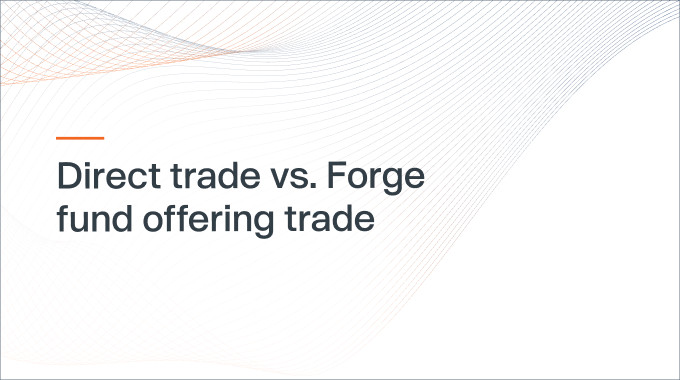Tax implications when buying and selling private company shares
[Please note: Forge does not provide tax, legal or accounting advice. This article has been prepared for informational purposes only, and is not intended to provide, and should not be relied on for, tax, legal or accounting advice. You should consult your own tax, legal and accounting advisors before engaging in any transaction.]
Key Takeaways:
- Capital gains taxes depend on how long you hold private shares, with relatively lower tax rates for investments held longer than a year.
- Qualified Small Business Stock (QSBS) can offer tax breaks, but you must meet certain company and holding period requirements.
- Smart strategies like tax-loss harvesting, using retirement accounts, and timing sales may potentially help reduce the taxes you owe.
- Always consult professional advisors, since private market tax rules are complex and careful planning is essential.
Navigating the world of private company share transactions can be complex, particularly when it comes to understanding the tax implications involved in buying and selling shares. This article explores capital gains tax treatment, potential qualified small business stock (QSBS) benefits and some available tax-efficient strategy considerations for managing private company investments.
Understanding capital gains taxes on private company shares
When buying and selling shares of a private company, a common tax consequence is the capital gains tax. Capital gains are the profits made from selling assets at a profit, whose tax bill depends on multiple factors. Some of these factors are listed below:
Short-term vs. long-term capital gains
- Short-term capital gains. If the holding period of a private investment is one year or less upon sale, the gains are typically taxed at the same rate as ordinary income. Depending on the seller’s income bracket and applicable tax laws, the tax rate can be as high as 37%.
- Long-term capital gains. Sellers who hold private shares for more than a year before selling may enjoy preferential tax rates, generally ranging from 0% to 20%, depending on their income level and applicable tax laws.
Qualified small business stock (QSBS)
One tax benefit available to investors in private companies is known as qualified small business stock (QSBS) treatment. It offers tax savings for investors who meet the criteria outlined under Section 1202 of the Internal Revenue Code.
Simply defined, QSBS is stock issued by a U.S. domestic C-corporation that meets the following requirements:
- The company’s gross assets must not exceed $50 million at the time of issuance and immediately thereafter.
- The stock must be issued directly by the company (i.e. secondary purchases are not eligible). Common or preferred stock can qualify as long as other criteria are met.
- At least 80% of the company’s asset value must be used for active conduct of one or more qualified businesses (i.e. excludes passive income activities such as owning real estate for rent).
- The stock must be held for more than five years.
Capital gains tax exclusion eligibility
Investors who hold QSBS for at least five years may be eligible for the exclusion of up to 100% of capital gains from the stock’s sale. The specific exclusion percentage depends on the following date on which the stock was acquired:
- For QSB stock acquired before Feb. 17, 2009, 50% of the gain can be excluded.
- For QSB stock acquired from Feb. 17, 2009, to Sept. 27, 2010, 75% of the gain can be excluded.
- For QSB stock acquired after Sept. 27, 2010, 100% of the gain can be excluded.
This exclusion applies to capital gains on the sale of up to $10 million or 10 times the adjusted basis of your investment in the stock, whichever is greater.
Considerations for QSBS eligibility and other strategies
Not every private company’s stock qualifies for QSBS treatment and some states specifically do not permit QSBS treatment. Furthermore, while the potential tax benefits can be useful, eligibility requirements apply, including holding the shares for required period to be considered for any potential tax advantages.
Final thoughts
Navigating the tax landscape of private company share transactions requires careful planning, a clear understanding of available incentives like QSBS, and a strategic approach to managing an investment portfolio. Becoming familiar with capital gains tax rules, exploring tax-efficient vehicles, and leveraging planning tools may allow investors to better position themselves for taxable events. While private market opportunities can be significant, the complexities surrounding them may be, as well—which makes it essential to consult qualified tax, legal and financial advisory resources to tailor strategies to an individual’s specific goals and circumstances.



